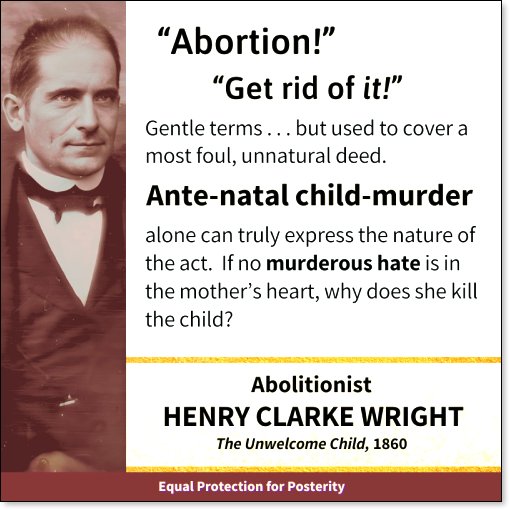
Siena Hoefling
At the time he was fighting slavery, abolitionist Henry Clarke Wright set his moral sight on another evil: abortion. Or, as he preferred to call it, “ante-natal child murder.”
Wright even penned a book in 1860 called The Unwelcome Child.
He wrote:
“‘Abortion!’ ‘Get rid of it!’ Gentle terms, these; respectable, no doubt, as some count gentle and respectable; but used to cover a most foul, unnatural deed. Ante-natal child murder alone can truly express the nature of the act. If no murderous hate is in the mother’s heart, why does she kill the child?”
“In this, how often is she aided by others!” he lamented. “There are those, and they are called men and women, whose profession is to devise ways to kill children before they are born. Those who do this would not hesitate to kill them after they are born; for the state of mind that would justify and instigate ante-natal child-murder, would justify and instigate post-natal child-murder.”
“Yet,” he noted, “public sentiment consigns the murderer of post-natal children to the dungeon or the gallows; while the murderers of ante-natal children are often allowed to pass in society as honest and honorable men and women.”
Wright quoted the Roman poet Juvenal’s “Maxima debetur pueris reverentia,” meaning, the greatest reverence is due to childhood. “Reverence childhood! If this be so important after the child is born, how much more reverence is due to ante-natal childhood?”

For all the passion he had against slavery, Wright equally condemned elective abortion in his book.
Eight years later, the ratification of the Fourteenth Amendment made clear that states must provide equal protection to all persons within their jurisdiction. No exceptions. Whether black or white, born or unborn, citizen or non-citizen, able or disabled—every person is guaranteed protection of basic human rights under the U.S. Constitution. No class of person is excluded.
In his book, Wright scolded husbands for causing “unwelcome” pregnancies. He thought abstinence in marriage would prevent wives from furiously making war on unwanted offspring. Yet he clarified: “The crime against the mother is great, but the crime against the child is greater, and more enduring and terrible in its consequences.”
Armed with anecdotes, Wright considered the invisible crime of abortion on the rise.
In one letter he provided, a woman revealed that her friend unsuccessfully “tried to murder” her two children before birth. She wrote, “This friend and myself made an estimate of the number of our near neighbors who, to our knowledge, had killed one or more of their children before they were born. Six, out of nine, had done the deed, or had procured the services of a ‘family physician’ to do it for them. They all justified the practice of ante-natal murder.”
Other letters he published said basically the same thing.
Wright asked, “How many women of New England have on their souls, at this hour, the ineffaceable stain of ante-natal child-murder? How many bear in their physical organism the incurable results of this crime? How many families are now suffering from it? Go ask the men and women doctors, who, for gold, perpetrate this crime, and who shamelessly advertise their infamy. Tens of thousands of wives and mothers are to be seen, all over the country, at once the perpetrators and victims of this cruel and disgusting act; all, all to administer to the sensualism of men, who are called husbands!”
While certainly marital harmony is ideal, a lack of agreement between husband and wife is no valid basis for abortion—as even Wright could see. But his slanted criticism of men ignored one of the primary reasons marriage exists. Marriage supplies the proper condition for mankind to fulfill God’s command to “be fruitful and multiply.” In their unique role, women need moral support and encouragement, as adults with responsibilities, no less than men. Motherhood is a privilege, not a curse, and it blesses alongside the sacrifice demanded by its nature.
But regardless of the circumstances behind the first spark of human life, basic rights must be protected from the beginning. Conception brings immediate parental—and governmental—obligations that supersede human will.
Abortion should never have found root in a nation built on the self-evident truth that all mankind is “created equal.” Along those lines, the U.S. Constitution was designed to benefit “posterity” no less than “ourselves.”
Following the directive by the Fourteenth Amendment to equally protect rights, every state made its code penalize abortion. But even then, the penalty tended to be lesser or non-existent for women, to accommodate the antiquated assumption that females are mentally less culpable. Relying on deficient state law, Roe v. Wade (and its sister, Dobbs v. Jackson), imagined a lack of general agreement in history and America about whether killing an unborn person is murder.
Wright shows that such confusion was not the case.
Remember, in the same decade the Fourteenth Amendment was ratified, Wright thought it undeniable that “the murderers of ante-natal children” should be consigned to the “dungeon or the gallows,” like the murderers of “post-natal children.”
All these decades later, it is time to correct any deficiency and safeguard, without fail, equality for every man, woman, and child. Blind justice and equal protection are vital to a functioning republic.
See also: Equal Protection for Posterity
© Siena HoeflingThe views expressed by RenewAmerica columnists are their own and do not necessarily reflect the position of RenewAmerica or its affiliates.



















